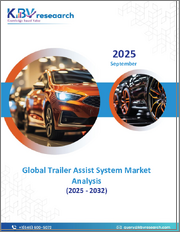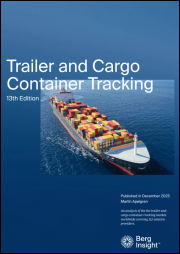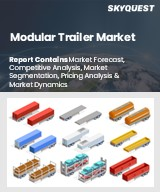
|
시장보고서
상품코드
1826688
트레일러 어시스트 시스템 시장 규모, 점유율, 업계 분석 리포트 : 최종 시장별, 기술 레벨별, 차종별, 컴포넌트별, 지역별, 전망과 예측(2025-2032년)Global Trailer Assist System Market Size, Share & Industry Analysis Report By End Market, By Technology Level, By Vehicle Type, By Component, By Regional Outlook and Forecast, 2025 - 2032 |
||||||
트레일러 어시스트 시스템 시장 규모는 예측 기간 중 9.1%의 CAGR로 시장 성장하며, 2032년까지 2억 2,058만 달러에 달할 것으로 예상됩니다.
주요 하이라이트:
- 북미 시장은 2024년 트레일러 어시스트 시스템 시장을 장악하여 2024년 37.00%의 매출 점유율을 차지했습니다.
- 미국 시장은 2032년까지 5,264만 달러 규모에 도달할 것으로 예상되며, 북미 시장에서의 리더십을 유지할 것으로 예측됩니다.
- 다양한 최종 시장 중 OEM 호환 시스템 부문이 2024년 85.43%의 매출 점유율을 차지하며 세계 시장을 장악할 것으로 예측됩니다.
- 기술 수준에서는 반자율형(SAE L1-L2) 부문이 2032년까지 160.64%의 매출 점유율을 차지하며 세계 시장을 주도할 것으로 예측됩니다.
- 승용차 시장은 2024년 주요 차종으로 부상하여 60.54%의 매출 점유율을 차지하며, 예측 기간 중 그 우위를 유지할 것으로 예측됩니다.
- 카메라 및 초음파 센서 부품 시장은 2032년 9,407만 달러 규모로 성장할 것으로 예상되며, 예측 기간 중 그 우위를 유지할 것으로 예측됩니다.
세계 트레일러 어시스트 시스템 시장은 고급 액세서리에서 픽업트럭, SUV, 소형 상용차의 일반적인 안전 및 편의 기능으로 진화했습니다. 이 시스템은 센서, 카메라, 레이더, 조향 모듈을 활용하여 트레일러의 주차 및 후진을 용이하게 합니다. 이를 통해 사고의 위험을 줄이고 운전자의 자신감을 향상시킬 수 있습니다. 안전 법규의 강화, 레저용 및 상업용 트레일러의 사용 증가, 첨단 운전 보조 기능에 대한 소비자 수요는 이 시스템의 보급을 촉진하는 주요 요인입니다. 실시간 이미지 처리 및 예측 알고리즘을 통한 첨단 자동화, 표준화를 요구하는 규제 당국의 압력, 그리고 고급차 이외의 다양한 모델에도 적용이 가능해졌습니다는 점 등이 주요 동향입니다.
또한 Ford, Land Rover, Volkswagen과 같은 대형 OEM과 센서 및 소프트웨어 전문성을 갖춘 기술 프로바이더들이 경쟁에서 우위를 점하고 있습니다. 혁신, 생태계 통합, 규제 준수 및 소비자 교육이 전략의 주요 초점이 되고 있습니다. 파트너십은 기술 개발을 가속화하고, 변화하는 안전 규정을 준수하는 것은 큰 이점을 가져다 줍니다. 스마트 트레일러의 연구와 커넥티드 생태계가 미래의 반자동 견인에 대한 전망을 제시하는 가운데, 트레일러 어시스트는 업계가 자율주행으로 전환하는 데 중요한 역할을 하게 될 것입니다.
시장 점유율 분석
COVID-19의 영향 분석
COVID-19 팬데믹은 트레일러 어시스트 시스템 시장에 부정적인 영향을 미쳤으며, 공급망 혼란, 생산 지연, 공장 폐쇄 및 반도체 부족으로 인한 제품 투입 제한을 초래했습니다. 소비 침체와 SUV, 픽업트럭, 상용차에 대한 수요 감소는 트레일러 보조 시스템의 보급을 더욱 둔화시켰고, OEM 업체들은 연구개발을 축소하고 기술 업그레이드를 미루고 있습니다. 업계 행사의 온라인화도 새로운 혁신에 대한 인지도를 떨어뜨렸습니다. 그러나 자동차 제조업체들이 안전, 편의성, 자동화에 다시 집중하면서 시장은 꾸준히 회복세를 보이고 있습니다.
최종 시장 전망
최종 시장에 따라 시장은 OEM 장착 시스템과 애프터마켓 개조로 나뉩니다. 애프터마켓 리트로핏 부문은 2024년 시장 점유율 15%를 보일 것으로 예측됩니다. 이 부문은 구매 후 트레일러 어시스트 기능을 추가하거나 업그레이드하고자 하는 차량 소유자를 대상으로 합니다. 유연성과 적응성에 대한 수요를 반영하여 소비자는 신차를 구매하지 않고도 고급 운전 지원 기능을 이용할 수 있게 됩니다. 이러한 개조 솔루션은 사용자 정의와 비용 효율적인 업그레이드를 원하는 사용자에게 매력적이며, 견인 안전과 기동성을 향상시키는 중요한 기능을 제공하는 경우가 많습니다.
차종별 전망
차종에 따라 시장은 승용차, 소형 상용차(LCV), 대형 상용차(HCV)로 분류됩니다. 소형 상용차(LCV) 부문은 2024년 시장 매출 점유율 27%를 보일 것으로 예측됩니다. 이 부문은 기동성과 운영 효율성이 중요한 물류, 라스트 마일 배송, 소규모 운송 수요에서 LCV의 사용 증가에 힘입어 성장하고 있습니다. 트레일러 어시스트 기술의 도입은 특히 공간이 제한된 도시 및 준도시 지역에서 운전자의 운전 조작성을 향상시킬 수 있습니다.
지역 전망
지역별로 트레일러 어시스트 시스템 시장은 북미, 유럽, 아시아태평양, LAMEA 및 기타 지역으로 분석되고 있습니다. 북미 부문은 2024년 시장에서 37%의 매출 점유율을 기록할 것으로 예측됩니다. 강력한 소비자 수요, 높은 트레일러 사용률, 엄격한 안전 규정, 미국 및 캐나다의 픽업, SUV, RV에 널리 사용됩니다. 포드 및 GM과 같은 OEM은 이를 표준 안전 및 편의 기능으로 통합하고 있습니다. 트레일러 어시스트는 EU 일반 안전 규정과 같은 엄격한 프레임워크를 통해 유럽에서 ADAS 컴플라이언스의 일부로 채택이 가속화되고 있습니다. 카메라, 센서, 예측 알고리즘을 사용하는 최첨단 시스템으로 폭스바겐, 아우디, 랜드로버 등 자동차 제조업체들이 최전선에 서 있습니다. 이들 지역이 함께 힘을 합쳐 트레일러 어시스트를 프리미엄 애드온에서 주류 규제 요건으로 전환하고 있습니다.
또한 레크리에이션 목적의 견인력 증가, 물류 확대, 규제 변경은 아시아태평양 및 LAMEA에서 채택의 주요 원동력이 되고 있습니다. 중국, 인도, 일본, 호주 등 아시아태평양 시장에서는 매스마켓 및 프리미엄 솔루션에 대한 수요가 증가하고 있습니다. OEM은 컴플라이언스와 편의성의 균형을 맞춘 확장 가능하고 합리적인 가격의 시스템에 초점을 맞추었습니다. 아직은 초기 단계이지만, 상용 트레일러가 일반적으로 사용되는 라틴아메리카나 SUV와 픽업트럭이 주류인 중동에서는 채택이 가속화되고 있습니다. 이 지역에서의 성장은 저렴한 가격, 차량군의 적응성, 캐러밴 어시스트를 유용하고 안전성을 향상시키는 기능으로 자리매김하는 새로운 안전 규정 준수 등의 요인에 의해 형성되고 있습니다.
목차
제1장 시장 범위와 조사 방법
- 시장의 정의
- 목적
- 시장 범위
- 세분화
- 조사 방법
제2장 시장 개관
- 주요 하이라이트
제3장 시장 개요
- 서론
- 개요
- 시장 구성과 시나리오
- 개요
- 시장에 영향을 미치는 주요 요인
- 시장 성장 촉진요인
- 시장 성장 억제요인
- 시장 기회
- 시장이 해결해야 할 과제
제4장 시장 동향 - 트레일러 어시스트 시스템 시장
제5장 트레일러 어시스트 시스템 시장의 경쟁 구도
제6장 제품수명주기 - 트레일러 어시스트 시스템 시장
제7장 시장 통합 - 트레일러 어시스트 시스템 시장
제8장 경쟁 분석 - 세계
- 시장 점유율 분석 2024
- 트레일러 어시스트 시스템 시장에서 최근 전략
- Porter's Five Forces 분석
제9장 트레일러 어시스트 시스템 시장의 밸류체인 분석
- 원재료와 부품
- 테크놀러지 프로바이더
- Original Equipment Manufacturers(OEM)
- 애프터마켓 공급업체
- 판매 대리점 및 딜러
- 최종사용자
제10장 주요 고객 기준 - 트레일러 어시스트 시스템 시장
제11장 세계 시장 : 최종 시장별
- 세계의 OEM 장착 시스템 시장 : 지역별
- 세계의 애프터마켓 개조 시장 : 지역별
제12장 세계 시장 : 기술 레벨별
- 세계의 반자율주행(SAEL1-L2) 시장 : 지역별
- 세계의 첨단·완전 자율주행차(SAEL3-L4) 시장 : 지역별
제13장 세계 시장 : 차종별
- 세계의 승용차 시장 : 지역별
- 세계의 소형 상용차(LCV) 시장 : 지역별
- 세계의 대형 상용차(HCV) 시장 : 지역별
제14장 세계 시장 : 컴포넌트별
- 세계의 카메라 및 초음파 센서 시장 : 지역별
- 세계의 소프트웨어 모듈과 알고리즘 시장 : 지역별
- 세계의 전자제어 유닛(ECU) 시장 : 지역별
제15장 세계 시장 : 지역별
- 북미
- 시장 성장 촉진요인
- 시장 성장 억제요인
- 시장 기회
- 시장이 해결해야 할 과제
- 북미의 시장 : 국가별
- 미국
- 캐나다
- 멕시코
- 기타 북미 지역
- 유럽
- 시장 성장 촉진요인
- 시장 성장 억제요인
- 시장 기회
- 시장이 해결해야 할 과제
- 유럽의 시장 : 국가별
- 독일
- 영국
- 프랑스
- 러시아
- 스페인
- 이탈리아
- 기타 유럽 지역
- 아시아태평양
- 시장 성장 촉진요인
- 시장 성장 억제요인
- 시장 기회
- 시장이 해결해야 할 과제
- 아시아태평양의 시장 : 국가별
- 중국
- 일본
- 인도
- 한국
- 싱가포르
- 말레이시아
- 기타 아시아태평양
- 라틴아메리카·중동 및 아프리카
- 시장 성장 촉진요인
- 시장 성장 억제요인
- 시장 기회
- 시장이 해결해야 할 과제
- 라틴아메리카·중동 및 아프리카의 시장 : 국가별
- 브라질
- 아르헨티나
- 아랍에미리트
- 사우디아라비아
- 남아프리카공화국
- 나이지리아
- 기타 라틴아메리카·중동 및 아프리카 지역
제16장 기업 개요
- Robert Bosch GmbH
- Continental AG
- Magna International, Inc
- ZF Friedrichshafen AG
- Valeo SA
- Ford Motor Company
- Volkswagen AG
- Garmin Ltd
- Westfalia Technologies, Inc
- General Motors Co
제17장 트레일러 어시스트 시스템 시장의 성공 필수 조건
KSA 25.10.15The Global Trailer Assist System Market size is expected to reach USD 220.58 million by 2032, rising at a market growth of 9.1% CAGR during the forecast period.
Key Highlights:
- The North America market dominated Global Trailer Assist System Market in 2024, accounting for a 37.00% revenue share in 2024.
- The U.S. market is projected to maintain its leadership in North America, reaching a market size of USD 52.64 million by 2032.
- Among the various End Market, the OEM-Fitted Systems segment dominated the global market, contributing a revenue share of 85.43% in 2024.
- In terms of Technology Level, Semi-Autonomous (SAE L1-L2) segment are expected to lead the global market, with a projected revenue share of 160.64% by 2032.
- The Passenger Cars market emerged as the leading Vehicle Type in 2024, capturing a 60.54% revenue share, and is projected to retain its dominance during the forecast period.
- The Cameras & Ultrasonic Sensors Market in Component is poised to grow at the market in 2032 with a market size of USD 94.07 million and is projected to maintain its dominant position throughout the forecast period.
The global trailer assist systems market has evolved from a luxury accessory to a commonplace safety and convenience feature in pickups, SUVs and light commercial vehicles. These systems make parking and reversing with trailers easier by utilising sensors, cameras, radar, and steering modules. This lowers the risk of accidents and increases driver confidence. Stricter safety laws, an increase in the use of recreational and commercial trailers, and consumer demand for cutting-edge driver assistance are the main factors driving adoption. More advanced automation with real-time imaging and predictive algorithms, regulatory pressure for standardisation, and broader availability beyond premium models are some of the major trends.
Furthermore, leading OEMs like Ford, Land Rover, and Volkswagen, as well as technology providers with expertise in sensors and software, dominate the competition. Innovation, ecosystem integration, regulatory compliance, and consumer education are the main focusses of strategies. Partnerships speed up technology development, while adherence to changing safety regulations offers a significant advantage. Trailer assist will play a significant role in the industry's transition to automated mobility as smart trailer research and connected ecosystems suggest semi-autonomous towing in the future.
Market Share Analysis
COVID 19 Impact Analysis
The COVID-19 pandemic had a negative impact on the trailer assist system market, disrupting supply chains, delaying production, and limiting product launches due to plant shutdowns and semiconductor shortages. Weakened consumer spending and reduced demand for SUVs, pickups, and commercial fleets further slowed adoption, while OEMs scaled back R&D and postponed technology upgrades. Industry events moving online also reduced visibility for new innovations. However, the market is now steadily recovering as automakers refocus on safety, convenience, and automation.
End Market Outlook
Based on End Market, the market is segmented into OEM-Fitted Systems, and Aftermarket Retrofits. The aftermarket retrofits segment recorded 15% revenue share in the market in 2024. This segment caters to vehicle owners who wish to add or upgrade trailer assist capabilities after purchase. It reflects a demand for flexibility and adaptability, giving consumers the opportunity to access advanced driving assistance without requiring a brand-new vehicle. These retrofit solutions appeal to users seeking customization and cost-effective upgrades, often providing essential features that improve towing safety and maneuverability.
Vehicle Type Outlook
Based on Vehicle Type, the market is segmented into Passenger Cars, Light Commercial Vehicles (LCV), and Heavy Commercial Vehicles (HCV). The light commercial vehicles (LCV) segment recorded 27% revenue share in the market in 2024. This segment is supported by the rising utilization of LCVs for logistics, last-mile delivery, and small-scale transportation needs, where maneuverability and operational efficiency are critical. The incorporation of trailer assist technologies enhances ease of operation for drivers, particularly in urban and semi-urban areas where space constraints are common.
Regional Outlook
Region-wise, the trailer assist system market is analyzed across North America, Europe, Asia Pacific, and LAMEA. The North America segment recorded 37% revenue share in the market in 2024. Strong consumer demand, high trailer usage, and stringent safety regulations are all contributing to the rapid expansion of the trailer assist system market in NorthAmerica and Europe. Trailer assist is widely used in pickups, SUVs, and RVs in North America, primarily in the United States and Canada. OEMs such as Ford and GM have integrated it as a standard safety and convenience feature. Trailer assist is now a part of ADAS compliance in Europe due to strict frameworks like the EU General Safety Regulation, which is speeding up adoption. With cutting-edge systems that use cameras, sensors, and predictive algorithms, automakers like Volkswagen, Audi, and Land Rover are at the forefront. Together, these regions are transforming trailer assist from a premium add-on into a mainstream, regulated requirement.
Furthermore, growth in recreational towing, expanding logistics, and changing regulations are the main drivers of adoption in Asia-Pacific and LAMEA, though at different rates. Both mass-market and premium solutions are in high demand in Asia-Pacific markets like China, India, Japan, and Australia. OEMs are concentrating on scalable and affordable systems that strike a balance between compliance and convenience. While adoption is still in its infancy, it is picking up steam in Latin America, where commercial trailers are commonly utilised, and the Middle East, where SUVs and pickups predominate. Growth in these areas is being shaped by factors like affordability, fleet adaptability, and compliance with new safety regulations, which establish caravan assist as a useful and safety-improving feature.
Recent Strategies Deployed in the Market
- Oct-2024: Volkswagen AG unveiled the Tayron SUV in Europe, offering mild hybrid, plug-in hybrid, gasoline, and diesel options. The eHybrid models provide over 100 km electric range and can tow up to 2.5 tonnes. Standard features include Trailer Assist, adaptive cruise control, lane-keeping, and parking aids, making towing safer and easier.
- Jan-2024: Ford Motor Company unveiled Pro Trailer Backup Assist on Ranger and Everest, simplifying trailer reversing. Available as standard or optional depending on the model, it integrates with towing features like trailer light check, blind-spot monitoring, and brake controllers. Additional enhancements include flexible rack systems, upgraded suspension, and standard tech and towing packs for improved safety, convenience, and versatility.
- May-2023: Robert Bosch GmbH announced the partnership with Plus to enhance commercial vehicle safety with the PlusDrive solution and Bosch's integrated steering system. The partnership delivers Level 2+ assisted driving features, including lane keeping, acceleration, braking, and over-the-air updates, improving driver retention, fuel efficiency, and accident prevention in software-defined trucks.
- Apr-2023: Ford Motor Company unveiled Pro Trailer Hitch Assist, an AI-driven system that simplifies hitching a truck to a trailer. Using rear cameras and radar, it automatically aligns the hitch with the trailer coupler while controlling speed, steering, and braking. Available on F-150, F-150 Lightning, and Super Duty models, it enhances safety and convenience.
- May-2022: Magna International, Inc. unveiled its advanced Surround View System on the 2022 Toyota Tundra, featuring 3D and 360-degree views, trailer guidance, multi-terrain view, and see-through hood. The system enhances safety, comfort, and maneuvering confidence, particularly for trailering, using cameras, electronic control units, and ADAS technologies.
List of Key Companies Profiled
- Robert Bosch GmbH
- Continental AG
- Magna International, Inc.
- ZF Friedrichshafen AG
- Valeo SA
- Ford Motor Company
- Volkswagen AG
- Garmin Ltd.
- Westfalia Technologies, Inc.
- General Motors Co.
Global Trailer Assist System Market Report Segmentation
By End Market
- OEM-Fitted Systems
- Aftermarket Retrofits
By Technology Level
- Semi-Autonomous (SAE L1-L2)
- Highly and Fully Autonomous (SAE L3-L4)
By Vehicle Type
- Passenger Cars
- Light Commercial Vehicles (LCV)
- Heavy Commercial Vehicles (HCV)
By Component
- Cameras & Ultrasonic Sensors
- Software Modules & Algorithms
- Electronic Control Units (ECU)
By Geography
- North America
- US
- Canada
- Mexico
- Rest of North America
- Europe
- Germany
- UK
- France
- Russia
- Spain
- Italy
- Rest of Europe
- Asia Pacific
- China
- Japan
- India
- South Korea
- Singapore
- Malaysia
- Rest of Asia Pacific
- LAMEA
- Brazil
- Argentina
- UAE
- Saudi Arabia
- South Africa
- Nigeria
- Rest of LAMEA
Table of Contents
Chapter 1. Market Scope & Methodology
- 1.1 Market Definition
- 1.2 Objectives
- 1.3 Market Scope
- 1.4 Segmentation
- 1.4.1 Global Trailer Assist System Market, by End Market
- 1.4.2 Global Trailer Assist System Market, by Technology Level
- 1.4.3 Global Trailer Assist System Market, by Vehicle Type
- 1.4.4 Global Trailer Assist System Market, by Component
- 1.4.5 Global Trailer Assist System Market, by Geography
- 1.5 Methodology for the research
Chapter 2. Market at a Glance
- 2.1 Key Highlights
Chapter 3. Market Overview
- 3.1 Introduction
- 3.1.1 Overview
- 3.1.1.1 Market Composition and Scenario
- 3.1.1 Overview
- 3.2 Key Factors Impacting the Market
- 3.2.1 Market Drivers
- 3.2.2 Market Restraints
- 3.2.3 Market Opportunities
- 3.2.4 Market Challenges
Chapter 4. Market Trends - Trailer Assist System Market
Chapter 5. State of Competition - Trailer Assist System Market
Chapter 6. Product Life Cycle - Trailer Assist System Market
Chapter 7. Market Consolidation - Trailer Assist System Market
Chapter 8. Competition Analysis - Global
- 8.1 Market Share Analysis, 2024
- 8.2 Recent Strategies Deployed in Trailer Assist System Market
- 8.3 Porter Five Forces Analysis
Chapter 9. Value Chain Analysis of Trailer Assist System Market
- 9.1 Raw Materials & Components
- 9.2 Technology Providers
- 9.3 Original Equipment Manufacturers (OEMs)
- 9.4 Aftermarket Suppliers
- 9.5 Distributors & Dealers
- 9.6 End Users
Chapter 10. Key Customer Criteria - Trailer Assist System Market
Chapter 11. Global Trailer Assist System Market by End Market
- 11.1 Global OEM-Fitted Systems Market by Region
- 11.2 Global Aftermarket Retrofits Market by Region
Chapter 12. Global Trailer Assist System Market by Technology Level
- 12.1 Global Semi-Autonomous (SAE L1-L2) Market by Region
- 12.2 Global Highly and Fully Autonomous (SAE L3-L4) Market by Region
Chapter 13. Global Trailer Assist System Market by Vehicle Type
- 13.1 Global Passenger Cars Market by Region
- 13.2 Global Light Commercial Vehicles (LCV) Market by Region
- 13.3 Global Heavy Commercial Vehicles (HCV) Market by Region
Chapter 14. Global Trailer Assist System Market by Component
- 14.1 Global Cameras & Ultrasonic Sensors Market by Region
- 14.2 Global Software Modules & Algorithms Market by Region
- 14.3 Global Electronic Control Units (ECU) Market by Region
Chapter 15. Global Trailer Assist System Market by Region
- 15.1 North America Trailer Assist System Market
- 15.1.1 Key Factors Impacting the Market
- 15.1.1.1 Market Drivers
- 15.1.1.2 Market Restraints
- 15.1.1.3 Market Opportunities
- 15.1.1.4 Market Challenges
- 15.1.2 Market Trends - North America Trailer Assist System Market
- 15.1.3 State of Competition - North America Trailer Assist System Market
- 15.1.4 North America Trailer Assist System Market by End Market
- 15.1.4.1 North America OEM-Fitted Systems Market by Region
- 15.1.4.2 North America Aftermarket Retrofits Market by Region
- 15.1.5 North America Trailer Assist System Market by Technology Level
- 15.1.5.1 North America Semi-Autonomous (SAE L1-L2) Market by Country
- 15.1.5.2 North America Highly and Fully Autonomous (SAE L3-L4) Market by Country
- 15.1.6 North America Trailer Assist System Market by Vehicle Type
- 15.1.6.1 North America Passenger Cars Market by Country
- 15.1.6.2 North America Light Commercial Vehicles (LCV) Market by Country
- 15.1.6.3 North America Heavy Commercial Vehicles (HCV) Market by Country
- 15.1.7 North America Trailer Assist System Market by Component
- 15.1.7.1 North America Cameras & Ultrasonic Sensors Market by Country
- 15.1.7.2 North America Software Modules & Algorithms Market by Country
- 15.1.7.3 North America Electronic Control Units (ECU) Market by Country
- 15.1.8 North America Trailer Assist System Market by Country
- 15.1.8.1 US Trailer Assist System Market
- 15.1.8.1.1 US Trailer Assist System Market by End Market
- 15.1.8.1.2 US Trailer Assist System Market by Technology Level
- 15.1.8.1.3 US Trailer Assist System Market by Vehicle Type
- 15.1.8.1.4 US Trailer Assist System Market by Component
- 15.1.8.2 Canada Trailer Assist System Market
- 15.1.8.2.1 Canada Trailer Assist System Market by End Market
- 15.1.8.2.2 Canada Trailer Assist System Market by Technology Level
- 15.1.8.2.3 Canada Trailer Assist System Market by Vehicle Type
- 15.1.8.2.4 Canada Trailer Assist System Market by Component
- 15.1.8.3 Mexico Trailer Assist System Market
- 15.1.8.3.1 Mexico Trailer Assist System Market by End Market
- 15.1.8.3.2 Mexico Trailer Assist System Market by Technology Level
- 15.1.8.3.3 Mexico Trailer Assist System Market by Vehicle Type
- 15.1.8.3.4 Mexico Trailer Assist System Market by Component
- 15.1.8.4 Rest of North America Trailer Assist System Market
- 15.1.8.4.1 Rest of North America Trailer Assist System Market by End Market
- 15.1.8.4.2 Rest of North America Trailer Assist System Market by Technology Level
- 15.1.8.4.3 Rest of North America Trailer Assist System Market by Vehicle Type
- 15.1.8.4.4 Rest of North America Trailer Assist System Market by Component
- 15.1.8.1 US Trailer Assist System Market
- 15.1.1 Key Factors Impacting the Market
- 15.2 Europe Trailer Assist System Market
- 15.2.1 Key Factors Impacting the Market
- 15.2.1.1 Market Drivers
- 15.2.1.2 Market Restraints
- 15.2.1.3 Market Opportunities
- 15.2.1.4 Market Challenges
- 15.2.2 Market Trends - Europe Trailer Assist System Market
- 15.2.3 State of Competition - Europe Trailer Assist System Market
- 15.2.4 Europe Trailer Assist System Market by End Market
- 15.2.4.1 Europe OEM-Fitted Systems Market by Country
- 15.2.4.2 Europe Aftermarket Retrofits Market by Country
- 15.2.5 Europe Trailer Assist System Market by Technology Level
- 15.2.5.1 Europe Semi-Autonomous (SAE L1-L2) Market by Country
- 15.2.5.2 Europe Highly and Fully Autonomous (SAE L3-L4) Market by Country
- 15.2.6 Europe Trailer Assist System Market by Vehicle Type
- 15.2.6.1 Europe Passenger Cars Market by Country
- 15.2.6.2 Europe Light Commercial Vehicles (LCV) Market by Country
- 15.2.6.3 Europe Heavy Commercial Vehicles (HCV) Market by Country
- 15.2.7 Europe Trailer Assist System Market by Component
- 15.2.7.1 Europe Cameras & Ultrasonic Sensors Market by Country
- 15.2.7.2 Europe Software Modules & Algorithms Market by Country
- 15.2.7.3 Europe Electronic Control Units (ECU) Market by Country
- 15.2.8 Europe Trailer Assist System Market by Country
- 15.2.8.1 Germany Trailer Assist System Market
- 15.2.8.1.1 Germany Trailer Assist System Market by End Market
- 15.2.8.1.2 Germany Trailer Assist System Market by Technology Level
- 15.2.8.1.3 Germany Trailer Assist System Market by Vehicle Type
- 15.2.8.1.4 Germany Trailer Assist System Market by Component
- 15.2.8.2 UK Trailer Assist System Market
- 15.2.8.2.1 UK Trailer Assist System Market by End Market
- 15.2.8.2.2 UK Trailer Assist System Market by Technology Level
- 15.2.8.2.3 UK Trailer Assist System Market by Vehicle Type
- 15.2.8.2.4 UK Trailer Assist System Market by Component
- 15.2.8.3 France Trailer Assist System Market
- 15.2.8.3.1 France Trailer Assist System Market by End Market
- 15.2.8.3.2 France Trailer Assist System Market by Technology Level
- 15.2.8.3.3 France Trailer Assist System Market by Vehicle Type
- 15.2.8.3.4 France Trailer Assist System Market by Component
- 15.2.8.4 Russia Trailer Assist System Market
- 15.2.8.4.1 Russia Trailer Assist System Market by End Market
- 15.2.8.4.2 Russia Trailer Assist System Market by Technology Level
- 15.2.8.4.3 Russia Trailer Assist System Market by Vehicle Type
- 15.2.8.4.4 Russia Trailer Assist System Market by Component
- 15.2.8.5 Spain Trailer Assist System Market
- 15.2.8.5.1 Spain Trailer Assist System Market by End Market
- 15.2.8.5.2 Spain Trailer Assist System Market by Technology Level
- 15.2.8.5.3 Spain Trailer Assist System Market by Vehicle Type
- 15.2.8.5.4 Spain Trailer Assist System Market by Component
- 15.2.8.6 Italy Trailer Assist System Market
- 15.2.8.6.1 Italy Trailer Assist System Market by End Market
- 15.2.8.6.2 Italy Trailer Assist System Market by Technology Level
- 15.2.8.6.3 Italy Trailer Assist System Market by Vehicle Type
- 15.2.8.6.4 Italy Trailer Assist System Market by Component
- 15.2.8.7 Rest of Europe Trailer Assist System Market
- 15.2.8.7.1 Rest of Europe Trailer Assist System Market by End Market
- 15.2.8.7.2 Rest of Europe Trailer Assist System Market by Technology Level
- 15.2.8.7.3 Rest of Europe Trailer Assist System Market by Vehicle Type
- 15.2.8.7.4 Rest of Europe Trailer Assist System Market by Component
- 15.2.8.1 Germany Trailer Assist System Market
- 15.2.1 Key Factors Impacting the Market
- 15.3 Asia Pacific Trailer Assist System Market
- 15.3.1 Key Factors Impacting the Market
- 15.3.1.1 Market Drivers
- 15.3.1.2 Market Restraints
- 15.3.1.3 Market Opportunities
- 15.3.1.4 Market Challenges
- 15.3.2 Market Trends - Asia Pacific Trailer Assist System Market
- 15.3.3 State of Competition - Asia Pacific Trailer Assist System Market
- 15.3.4 Asia Pacific Trailer Assist System Market by End Market
- 15.3.4.1 Asia Pacific OEM-Fitted Systems Market by Country
- 15.3.4.2 Asia Pacific Aftermarket Retrofits Market by Country
- 15.3.5 Asia Pacific Trailer Assist System Market by Technology Level
- 15.3.5.1 Asia Pacific Semi-Autonomous (SAE L1-L2) Market by Country
- 15.3.5.2 Asia Pacific Highly and Fully Autonomous (SAE L3-L4) Market by Country
- 15.3.6 Asia Pacific Trailer Assist System Market by Vehicle Type
- 15.3.6.1 Asia Pacific Passenger Cars Market by Country
- 15.3.6.2 Asia Pacific Light Commercial Vehicles (LCV) Market by Country
- 15.3.6.3 Asia Pacific Heavy Commercial Vehicles (HCV) Market by Country
- 15.3.7 Asia Pacific Trailer Assist System Market by Component
- 15.3.7.1 Asia Pacific Cameras & Ultrasonic Sensors Market by Country
- 15.3.7.2 Asia Pacific Software Modules & Algorithms Market by Country
- 15.3.7.3 Asia Pacific Electronic Control Units (ECU) Market by Country
- 15.3.8 Asia Pacific Trailer Assist System Market by Country
- 15.3.8.1 China Trailer Assist System Market
- 15.3.8.1.1 China Trailer Assist System Market by End Market
- 15.3.8.1.2 China Trailer Assist System Market by Technology Level
- 15.3.8.1.3 China Trailer Assist System Market by Vehicle Type
- 15.3.8.1.4 China Trailer Assist System Market by Component
- 15.3.8.2 Japan Trailer Assist System Market
- 15.3.8.2.1 Japan Trailer Assist System Market by End Market
- 15.3.8.2.2 Japan Trailer Assist System Market by Technology Level
- 15.3.8.2.3 Japan Trailer Assist System Market by Vehicle Type
- 15.3.8.2.4 Japan Trailer Assist System Market by Component
- 15.3.8.3 India Trailer Assist System Market
- 15.3.8.3.1 India Trailer Assist System Market by End Market
- 15.3.8.3.2 India Trailer Assist System Market by Technology Level
- 15.3.8.3.3 India Trailer Assist System Market by Vehicle Type
- 15.3.8.3.4 India Trailer Assist System Market by Component
- 15.3.8.4 South Korea Trailer Assist System Market
- 15.3.8.4.1 South Korea Trailer Assist System Market by End Market
- 15.3.8.4.2 South Korea Trailer Assist System Market by Technology Level
- 15.3.8.4.3 South Korea Trailer Assist System Market by Vehicle Type
- 15.3.8.4.4 South Korea Trailer Assist System Market by Component
- 15.3.8.5 Singapore Trailer Assist System Market
- 15.3.8.5.1 Singapore Trailer Assist System Market by End Market
- 15.3.8.5.2 Singapore Trailer Assist System Market by Technology Level
- 15.3.8.5.3 Singapore Trailer Assist System Market by Vehicle Type
- 15.3.8.5.4 Singapore Trailer Assist System Market by Component
- 15.3.8.6 Malaysia Trailer Assist System Market
- 15.3.8.6.1 Malaysia Trailer Assist System Market by End Market
- 15.3.8.6.2 Malaysia Trailer Assist System Market by Technology Level
- 15.3.8.6.3 Malaysia Trailer Assist System Market by Vehicle Type
- 15.3.8.6.4 Malaysia Trailer Assist System Market by Component
- 15.3.8.7 Rest of Asia Pacific Trailer Assist System Market
- 15.3.8.7.1 Rest of Asia Pacific Trailer Assist System Market by End Market
- 15.3.8.7.2 Rest of Asia Pacific Trailer Assist System Market by Technology Level
- 15.3.8.7.3 Rest of Asia Pacific Trailer Assist System Market by Vehicle Type
- 15.3.8.7.4 Rest of Asia Pacific Trailer Assist System Market by Component
- 15.3.8.1 China Trailer Assist System Market
- 15.3.1 Key Factors Impacting the Market
- 15.4 LAMEA Trailer Assist System Market
- 15.4.1 Key Factors Impacting the Market
- 15.4.1.1 Market Drivers
- 15.4.1.2 Market Restraints
- 15.4.1.3 Market Opportunities
- 15.4.1.4 Market Challenges
- 15.4.2 Market Trends - LAMEA Trailer Assist System Market
- 15.4.3 State of Competition - LAMEA Trailer Assist System Market
- 15.4.4 LAMEA Trailer Assist System Market by End Market
- 15.4.4.1 LAMEA OEM-Fitted Systems Market by Country
- 15.4.4.2 LAMEA Aftermarket Retrofits Market by Country
- 15.4.5 LAMEA Trailer Assist System Market by Technology Level
- 15.4.5.1 LAMEA Semi-Autonomous (SAE L1-L2) Market by Country
- 15.4.5.2 LAMEA Highly and Fully Autonomous (SAE L3-L4) Market by Country
- 15.4.6 LAMEA Trailer Assist System Market by Vehicle Type
- 15.4.6.1 LAMEA Passenger Cars Market by Country
- 15.4.6.2 LAMEA Light Commercial Vehicles (LCV) Market by Country
- 15.4.6.3 LAMEA Heavy Commercial Vehicles (HCV) Market by Country
- 15.4.7 LAMEA Trailer Assist System Market by Component
- 15.4.7.1 LAMEA Cameras & Ultrasonic Sensors Market by Country
- 15.4.7.2 LAMEA Software Modules & Algorithms Market by Country
- 15.4.7.3 LAMEA Electronic Control Units (ECU) Market by Country
- 15.4.8 LAMEA Trailer Assist System Market by Country
- 15.4.8.1 Brazil Trailer Assist System Market
- 15.4.8.1.1 Brazil Trailer Assist System Market by End Market
- 15.4.8.1.2 Brazil Trailer Assist System Market by Technology Level
- 15.4.8.1.3 Brazil Trailer Assist System Market by Vehicle Type
- 15.4.8.1.4 Brazil Trailer Assist System Market by Component
- 15.4.8.2 Argentina Trailer Assist System Market
- 15.4.8.2.1 Argentina Trailer Assist System Market by End Market
- 15.4.8.2.2 Argentina Trailer Assist System Market by Technology Level
- 15.4.8.2.3 Argentina Trailer Assist System Market by Vehicle Type
- 15.4.8.2.4 Argentina Trailer Assist System Market by Component
- 15.4.8.3 UAE Trailer Assist System Market
- 15.4.8.3.1 UAE Trailer Assist System Market by End Market
- 15.4.8.3.2 UAE Trailer Assist System Market by Technology Level
- 15.4.8.3.3 UAE Trailer Assist System Market by Vehicle Type
- 15.4.8.3.4 UAE Trailer Assist System Market by Component
- 15.4.8.4 Saudi Arabia Trailer Assist System Market
- 15.4.8.4.1 Saudi Arabia Trailer Assist System Market by End Market
- 15.4.8.4.2 Saudi Arabia Trailer Assist System Market by Technology Level
- 15.4.8.4.3 Saudi Arabia Trailer Assist System Market by Vehicle Type
- 15.4.8.4.4 Saudi Arabia Trailer Assist System Market by Component
- 15.4.8.5 South Africa Trailer Assist System Market
- 15.4.8.5.1 South Africa Trailer Assist System Market by End Market
- 15.4.8.5.2 South Africa Trailer Assist System Market by Technology Level
- 15.4.8.5.3 South Africa Trailer Assist System Market by Vehicle Type
- 15.4.8.5.4 South Africa Trailer Assist System Market by Component
- 15.4.8.6 Nigeria Trailer Assist System Market
- 15.4.8.6.1 Nigeria Trailer Assist System Market by End Market
- 15.4.8.6.2 Nigeria Trailer Assist System Market by Technology Level
- 15.4.8.6.3 Nigeria Trailer Assist System Market by Vehicle Type
- 15.4.8.6.4 Nigeria Trailer Assist System Market by Component
- 15.4.8.7 Rest of LAMEA Trailer Assist System Market
- 15.4.8.7.1 Rest of LAMEA Trailer Assist System Market by End Market
- 15.4.8.7.2 Rest of LAMEA Trailer Assist System Market by Technology Level
- 15.4.8.7.3 Rest of LAMEA Trailer Assist System Market by Vehicle Type
- 15.4.8.7.4 Rest of LAMEA Trailer Assist System Market by Component
- 15.4.8.1 Brazil Trailer Assist System Market
- 15.4.1 Key Factors Impacting the Market
Chapter 16. Company Profiles
- 16.1 Robert Bosch GmbH
- 16.1.1 Company Overview
- 16.1.2 Financial Analysis
- 16.1.3 Segmental and Regional Analysis
- 16.1.4 Research & Development Expenses
- 16.1.5 Recent strategies and developments:
- 16.1.5.1 Partnerships, Collaborations, and Agreements:
- 16.1.6 SWOT Analysis
- 16.2 Continental AG
- 16.2.1 Company Overview
- 16.2.2 Financial Analysis
- 16.2.3 Segmental and Regional Analysis
- 16.2.4 Research & Development Expense
- 16.2.5 SWOT Analysis
- 16.3 Magna International, Inc.
- 16.3.1 Company Overview
- 16.3.2 Financial Analysis
- 16.3.3 Segmental and Regional Analysis
- 16.3.4 Research & Development Expenses
- 16.3.5 Recent strategies and developments:
- 16.3.5.1 Partnerships, Collaborations, and Agreements:
- 16.3.5.2 Product Launches and Product Expansions:
- 16.3.6 SWOT Analysis
- 16.4 ZF Friedrichshafen AG
- 16.4.1 Company Overview
- 16.4.2 Financial Analysis
- 16.4.3 Regional Analysis
- 16.4.4 Research & Development Expenses
- 16.4.5 SWOT Analysis
- 16.5 Valeo SA
- 16.5.1 Company Overview
- 16.5.2 Financial Analysis
- 16.5.3 Segmental and Regional Analysis
- 16.5.4 Research & Development Expense
- 16.5.5 SWOT Analysis
- 16.6 Ford Motor Company
- 16.6.1 Company Overview
- 16.6.2 Financial Analysis
- 16.6.3 Segmental and Regional Analysis
- 16.6.4 Engineering, research, and development expenses
- 16.6.5 Recent strategies and developments:
- 16.6.5.1 Product Launches and Product Expansions:
- 16.6.6 SWOT Analysis
- 16.7 Volkswagen AG
- 16.7.1 Company Overview
- 16.7.2 Financial Analysis
- 16.7.3 Segmental and Regional Analysis
- 16.7.4 Research & Development Expense
- 16.7.5 Recent strategies and developments:
- 16.7.5.1 Product Launches and Product Expansions:
- 16.7.6 SWOT Analysis
- 16.8 Garmin Ltd.
- 16.8.1 Company Overview
- 16.8.2 Financial Analysis
- 16.8.3 Segmental and Regional Analysis
- 16.8.4 Research & Development Expenses
- 16.8.5 SWOT Analysis
- 16.9 Westfalia Technologies, Inc.
- 16.9.1 Company Overview
- 16.9.2 SWOT Analysis
- 16.10. General Motors Co.
- 16.10.1 Company Overview
- 16.10.2 Financial Analysis
- 16.10.3 Segmental and Regional Analysis
- 16.10.4 Regional analysis
- 16.10.5 Research & Development Expense



















